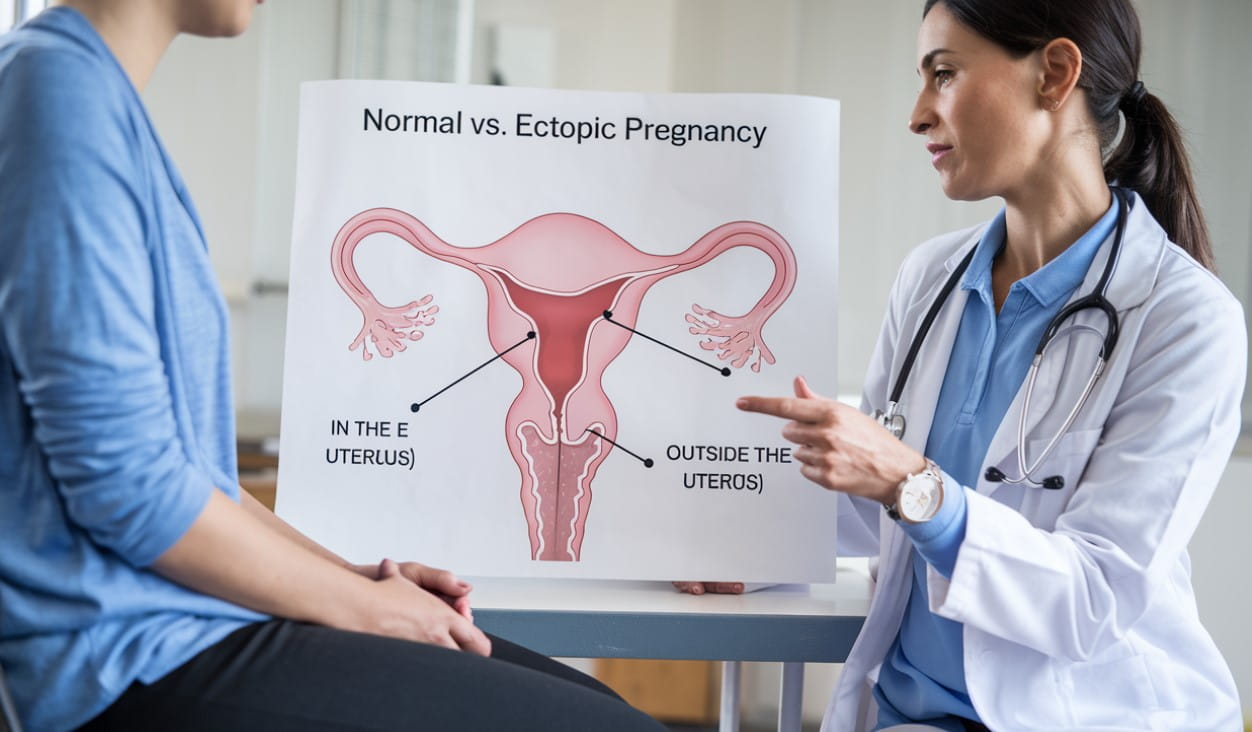
Understanding the nuances of early pregnancy is crucial for every woman. While the anticipation of a growing life is joyous, it's vital to be aware of potential complications like an ectopic pregnancy. This condition, where the fertilized egg implants outside the uterus – most commonly in the fallopian tube – requires prompt medical attention. This blog post will delve into the key differences between an ectopic pregnancy and a normal intrauterine pregnancy, focusing on early signs and symptoms to watch out for, and why understanding the difference between a healthy pregnancy and an ectopic pregnancy is essential for your well-being. We aim to provide clear information to help you differentiate between the feeling of a normal pregnancy versus the pain of an ectopic pregnancy, and address concerns about how to know if it's a normal pregnancy or something else.
The Beginning: Implantation is Key
In a normal pregnancy, after fertilization, the egg travels down the fallopian tube and implants in the lining of the uterus. This is where it will grow and develop throughout the nine months.
In contrast, an ectopic pregnancy occurs when the fertilized egg implants in a location outside the uterus. The most common site is the fallopian tube (accounting for over 90% of cases), but it can also occur in the ovaries, cervix, or even the abdominal cavity.
Early Symptoms: Similarities and Crucial Differences
In the very early stages, both normal and ectopic pregnancies can present with similar symptoms due to hormonal changes. These can include:
- Missed period: This is often the first sign of any pregnancy.
- Breast tenderness and swelling: Hormonal fluctuations can cause discomfort in the breasts.
- Nausea and vomiting (morning sickness): This can occur in both types of pregnancies.
- Fatigue: Feeling unusually tired is common in early pregnancy.
- Frequent urination: Hormonal changes can increase the need to urinate.
However, as an ectopic pregnancy progresses, it often presents with distinct and concerning symptoms that differentiate it from a normal pregnancy. These are crucial early signs of an ectopic pregnancy that should never be ignored:
1. Unilateral (one-sided) pelvic or abdominal pain: This pain can range from dull and aching to sharp, stabbing, or cramp-like. It's often localized to one side of the lower abdomen.
2.Abnormal vaginal bleeding: This bleeding may be lighter or heavier than a normal period and can be intermittent or continuous. It's often described as spotting or a dark, watery discharge.
3. Shoulder pain: This is a referred pain caused by internal bleeding irritating the diaphragm and phrenic nerve. It's often felt at the tip of the shoulder or neck.
4. Dizziness or fainting: Internal bleeding can lead to a drop in blood pressure, causing lightheadedness or fainting spells.
The Feeling: Normal Pregnancy vs. Ectopic Pregnancy Pain
Many women wonder about the feeling of a normal pregnancy versus the pain of an ectopic pregnancy. While normal early pregnancy can involve mild cramping or discomfort as the uterus stretches, the pain associated with an ectopic pregnancy is typically more intense, localized, and progressive. It's important to pay attention to the location, intensity, and nature of any abdominal pain you experience in early pregnancy.
Diagnosis: How Doctors Differentiate
If an ectopic pregnancy is suspected, doctors will use several methods to confirm the diagnosis and differentiate it from a normal pregnancy:
1.Pelvic Exam: A physical examination to check for tenderness or masses in the pelvic area.
2.Blood Tests (hCG levels): Human chorionic gonadotropin (hCG) is a hormone produced during pregnancy. In a normal pregnancy, hCG levels typically double every 48-72 hours in early stages. In an ectopic pregnancy, hCG levels may rise slower or not at all.
3.Transvaginal Ultrasound: This imaging technique allows doctors to visualize the uterus and fallopian tubes to determine the location of the pregnancy. The absence of a gestational sac within the uterus, combined with the presence of a mass outside the uterus, strongly suggests an ectopic pregnancy.
Why Early Detection Matters
Understanding the difference between a healthy pregnancy and an ectopic pregnancy is critical because an ectopic pregnancy is not viable and can be life-threatening if left untreated. As the ectopic pregnancy grows, it can cause the fallopian tube to rupture, leading to severe internal bleeding, shock, and even death. Early detection allows for timely intervention, which can often be managed with medication or minimally invasive surgical procedures, preserving the woman's health and future fertility.
Conclusion: Seek Prompt Medical Attention
While early pregnancy can bring about various sensations, it's crucial to be vigilant about any unusual or severe abdominal pain, abnormal bleeding, or other concerning symptoms like shoulder pain or dizziness. If you experience any of the early signs of an ectopic pregnancy, it's vital to seek immediate medical attention. Prompt diagnosis and treatment are essential for your health and well-being. Understanding the key differences between an ectopic pregnancy and a normal pregnancy empowers you to be informed and proactive about your reproductive health.
Thankfully, Hillspring Bio offers a kit that can aid in the early detection of ectopic pregnancy. For more information on this potentially life-saving tool, please email admin@hillspringbio.com. Recognizing the crucial differences between a normal and ectopic pregnancy, and seeking prompt medical attention for concerning symptoms, remains paramount for every woman's well-being.


